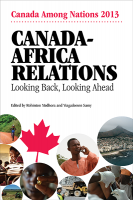Canada Among Nations is the premier source for contemporary insight into pressing Canadian foreign policy issues. Started at the Norman Paterson School of International Affairs (NPSIA) at Carleton University, the series has brought together leading scholars, practitioners, journalists and members of the non-governmental organization community for an assessment of Canada’s foreign policy since 1984. The Centre for International Governance Innovation is proud to partner with the NPSIA, on previous and future editions of Canada Among Nations.
In this edition, contributors explore Canada and Africa’s rich history, taking stock of what has been accomplished. This volume offers recommendations for a more strategically beneficial Canada-Africa partnership in areas including trade and investment, democracy and nation building, development aid, governance, corporate social responsibility — especially in the natural resource sector where Canadian firms are heavily invested — and regional security.



